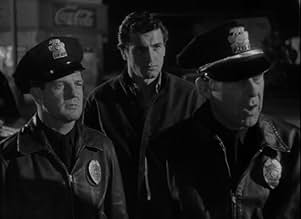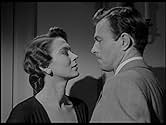After stealing a gangster's money and his girlfriend, a doctor heads for a small village in Mexico.After stealing a gangster's money and his girlfriend, a doctor heads for a small village in Mexico.After stealing a gangster's money and his girlfriend, a doctor heads for a small village in Mexico.
Märta Torén
- Laura Thorsen
- (as Marta Toren)
Emma Roldán
- Catalina
- (as Emma Roldan)
George J. Lewis
- Capt. Rodriguez
- (as George Lewis)
James Best
- Driver
- (uncredited)
Joe Dominguez
- Bias
- (uncredited)
Paul Fierro
- Bandit
- (uncredited)
Nacho Galindo
- Mexican Villager with Heartburn
- (uncredited)
Rock Hudson
- Truck Driver
- (uncredited)
- Director
- Writer
- All cast & crew
- Production, box office & more at IMDbPro
Featured reviews
I tend to mostly avoid James Mason films in a British setting as he frequently evokes the staid, bloodless, leather driving glove school of acting of England in the 1950s.
Here, however, as a fish out of water character in this U. S / Mexican saga he is rather good. The accompanying cast of Marta Toren, William Conrad and the always excellent Dan Duryea are hard to resist. The final act contrasts of a baked Mexican pueblo back to a rain sodden nocturnal American city are extremely evocative. Ditching the Noir urban for a village, and redemption in the bucolic charms of country life is a novel take for a film of this genre.
Here's the kicker - very hard to find a 35mm converted version of this film, instead it is the horror of Blu ray / HD manipulations which are in ready supply, a technology which completely destroys old movies. The displaced filmic world, the wealth and grain of celluloid is replaced by shiny, immediate, clear cut images, completely erasing depth of field and the necessary suspension of disbelief - instead, constantly jolting the viewer out of absorption and into an over awareness of sets, props and the artifice of production.
Here, however, as a fish out of water character in this U. S / Mexican saga he is rather good. The accompanying cast of Marta Toren, William Conrad and the always excellent Dan Duryea are hard to resist. The final act contrasts of a baked Mexican pueblo back to a rain sodden nocturnal American city are extremely evocative. Ditching the Noir urban for a village, and redemption in the bucolic charms of country life is a novel take for a film of this genre.
Here's the kicker - very hard to find a 35mm converted version of this film, instead it is the horror of Blu ray / HD manipulations which are in ready supply, a technology which completely destroys old movies. The displaced filmic world, the wealth and grain of celluloid is replaced by shiny, immediate, clear cut images, completely erasing depth of field and the necessary suspension of disbelief - instead, constantly jolting the viewer out of absorption and into an over awareness of sets, props and the artifice of production.
This movie was a joy to watch and James Mason really shines in his role as well as Dan Duryea, and William Conrad. I loved every minute until the very end which to me was so senseless. I won't give it away but this film would have been a ten out of ten had it not been for this mistake. It is still a very entertaining film.
James Mason, Marta Toren, Dan Duryea, and William Conrad all do a wonderful job in this first-rate production of a doctor's misadventures after associating with the wrong kind of people. A few bad decisions is all it takes; that and the Production Code, which single-handedly ruined the end of this film. A doctor hatches a clever plan to rob thieves of their heist money, and takes the moll of gangster Duryea as well. As the two flee to Mexico, there is a turn of events and the good character of the doctor begins to emerge. I will not reveal the miserable ending to this potentially wonderful film, but suffice it to say that those who decided on this ending were merely cowards, and had not a trace of real humanity within them.
One Way Street opens beautifully. Sirens shriek through the Los Angeles nightscape while, from the window of an apartment building, an elegant woman (Marta Toren) smokes as she watches them disappear. She reports her observations to Dan Duryea, who has just masterminded a big heist. One of his lieutenants (William Conrad), however, has taken a bullet, which gang-sawbones James Mason is summoned to extract. He does so, meanwhile launching a ploy by which he departs not only with all the loot but with Toren Duryea's moll. Although fate almost deflects their escape, they finally cross the border to Mexico.
And here the movie settles in for a long siesta. Mason and Toren find themselves in a primitive village where Mason's medical skills are pressed into service (he cures a horse but can't save a little girl). There's plenty of warmed-over wisdom issuing from an itinerant priest (Basil Ruysdael) and plenty of danger from bandidos who keep cropping up, swigging mezcal while wiping their lips with the backs of their hands and eying Toren up, down and sideways. Despite these distractions, she seems to like it there and wants to stay, but Mason wants to press on to Mexico City (and their divergent goals and low-key temperaments serve to keep the romance distinctly cool).
This snooze is interrupted a couple of times by cuts back to Los Angeles, where Duryea and Conrad are bent on recouping the money and on revenge. But only when Mason returns to have a face-to-face reckoning with Duryea does the movie spring back to life. And in a rhyme of its earlier, unexpected intervention, fate proves that it always has the last word.
One Way Street was the first feature in English by the Argentinian-born director Hugo Fregonese, who stayed in Hollywood long enough to churn out a few westerns and genre-pictures (Man In The Attic, one of the many versions of The Lodger was his work). From the bookends that open and close One Way Street, he had a feel for the look and pace of film noir, but the thick volume of Mexican folklore they surround turns out to be a not very film-worthy property.
And here the movie settles in for a long siesta. Mason and Toren find themselves in a primitive village where Mason's medical skills are pressed into service (he cures a horse but can't save a little girl). There's plenty of warmed-over wisdom issuing from an itinerant priest (Basil Ruysdael) and plenty of danger from bandidos who keep cropping up, swigging mezcal while wiping their lips with the backs of their hands and eying Toren up, down and sideways. Despite these distractions, she seems to like it there and wants to stay, but Mason wants to press on to Mexico City (and their divergent goals and low-key temperaments serve to keep the romance distinctly cool).
This snooze is interrupted a couple of times by cuts back to Los Angeles, where Duryea and Conrad are bent on recouping the money and on revenge. But only when Mason returns to have a face-to-face reckoning with Duryea does the movie spring back to life. And in a rhyme of its earlier, unexpected intervention, fate proves that it always has the last word.
One Way Street was the first feature in English by the Argentinian-born director Hugo Fregonese, who stayed in Hollywood long enough to churn out a few westerns and genre-pictures (Man In The Attic, one of the many versions of The Lodger was his work). From the bookends that open and close One Way Street, he had a feel for the look and pace of film noir, but the thick volume of Mexican folklore they surround turns out to be a not very film-worthy property.
I quite enjoyed James Mason's performance here as the calculating "Dr. Matson". He is frequently summoned to treat the hoodlums of gangster "Wheeler" (Dan Duryea) and during one such visit espies a bag, similar to his own, that contains $200,000 in stolen loot. After a bit of macho banter with his patient, he picks up the bag and makes for the door. He has given the boss some pills and any interference will prevent him from getting the antidote! This is the moment that moll "Laura" (Märta Torén) has been waiting for and she decides to abscond with the doctor. Their escape plan doesn't quite go to plan, though - a car and a plane accident - before they find themselves in a small town where his skills and their burgeoning love start to make them wonder if their master plan is still the best one. Meantime, though very much on the back burner, the mobsters are determined to avenge themselves on both of them. It does rather run out of steam with half an hour to go, and though the ending is actually quite fitting it was all just a little bit rushed and, I felt, frustrating! Still, there's some chemistry between the two and Basil Ruysdael's priest, a sick horse and some really lightweight banditos all play to the story quite well too. You'll probably not recall it afterwards, but it's a bit different.
Did you know
- TriviaThe first U.S. film of Argentinean director Hugo Fregonese.
- GoofsWhen Father Moreno, Matson, and Laura arrive at the Mexican village, Father Moreno begins to tie his donkey to a straight pole. However, in the next immediate cut, he is tying it to a crooked tree stump.
- Crazy creditsIntro: Waste no moment, nor a single breath In fearful flight from Death; For no matter the tears that may be wept, The appointment will be kept... From: "Song of a Fatalist"
- ConnectionsReferenced in James Mason: The Star They Loved to Hate (1984)
- How long is One Way Street?Powered by Alexa
Details
- Release date
- Country of origin
- Official sites
- Languages
- Also known as
- One Way Street
- Filming locations
- Production company
- See more company credits at IMDbPro
- Runtime
- 1h 19m(79 min)
- Color
- Aspect ratio
- 1.37 : 1
Contribute to this page
Suggest an edit or add missing content


























